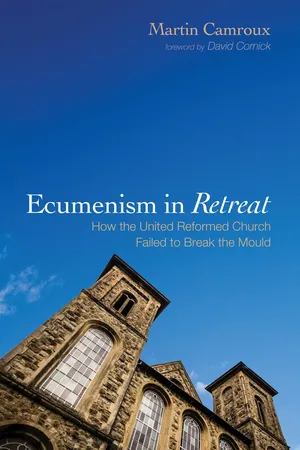![]()
1
Ecumenical Renewal
In his enthronement sermon in 1942 William Temple famously declared the ecumenical movement to be “the great new fact of our era,” and for much of the twentieth century it was the major metanarrative for church renewal. By the end of the century, however, the enthusiasm had largely dissipated, the organizations which represented it were in decline, and the hoped for organic unity looked further away than ever. In this book I want to study this ecumenical failure through the prism of the United Reformed Church, which was formed in 1972 by a union of the Congregational and Presbyterian Churches, and saw its formation as a catalyst for ecumenical renewal. As the only church union across denominational boundaries in England (with the minor exception of its own union with the Churches of Christ in 1981) it offers a unique perspective on the ecumenical movement. It has been almost entirely neglected as a subject for academic research and offers considerable opportunities for original research.
It was Plato who said that “the unexamined life is not worth living” and this story is part of my life. The mid-1960s was an exciting time to be a Christian. John Robinson’s Honest to God (1963) had fired me with the conviction that the church could change and be renewed and that you could bring a total honesty to the religious search. Nothing was off limits. Everything was possible. Then, while a student at the University of Hull from 1966 to 1969, I met ecumenism. I joined the Congregational-Baptist Society, the Methodist Society, and the Student Christian Movement. I enjoyed bread-and-cheese lunches at the Anglican and Catholic chaplaincies and in the Quaker chaplain office. I became Chairman of the ecumenical Christian Association (which united the different denominational student societies) and led ecumenical meetings and conferences. Like John Robinson it seemed to me that that the existence of so many churches was “an abomination . . . surely now on its way out . . . and the prayers and actions of all Christians must be engaged in furthering the movements towards organic unity at every level.” But this was only the beginning. A great renewal of the church was imminent. From the perspective of the Roman Catholic Church, but with wider application, Michael Novak could conclude:
In retrospect it is clear that much of this was not thought through. I assumed organic unity was right because it was the prevailing zeitgeist of the circles in which I moved. It never occurred to me to compare it with other models of unity, or ask whether I would want to belong to an established church, or indeed if church unity was really a matter of concern to anyone outside the church. I hardly noticed that the evangelical Christian Union did not share our enthusiasm and had little contact with the rest of us, or we with them. Everywhere barriers were coming down, the spirit moving. As John Robinson put it, “Faith has been let loose.”
Meanwhile my own Congregational Church, under the strong guidance of its General Secretary, John Huxtable, was moving to a union with the Presbyterians, which would break the ecumenical logjam and be the first step towards the wider union we all looked for. It became for me a life commitment. Ordained as a United Reformed Church minister in 1975, of the four churches I have served three were in local ecumenical partnerships, including two joint URC-Methodist churches. This book is an attempt to reflect historically, theologically, and sociologically upon my experience and the ecumenical hope I have cherished.
I make no claim to be a detached observer. I am a twenty-first-century, white, male, British Christian from a liberal Reformed tradition whose working life has been committed to the ecumenical movement. It is impossible for me to be a value-neutral observer. Inevitably my beliefs will influence my judgement and the point in history from which I observe will affect what I see. As the theologian Rudolf Bultmann has insisted, the “demand that the interpreter must silence his subjectivity and extinguish his individuality . . . is . . . the most absurd one that can be imagined.”
This does not mean that the attempt to write” objective history should be set aside. Historians and theologians will have views but should seek not to allow them to dictate their conclusions. Richard Evans puts the historian’s task powerfully: “I will look humbly at the past and say . . . it really happened, and we really can, if we are very scrupulous and careful and self-critical . . . find out how it happened and reach some tenable though always less than final conclusions about what it all meant.” That is what has been attempted in this book. We may choose our research area and questions according to our preferences, but not our conclusions.
Secularization Theory
The sociological context both for ecumenism in general and for the history of the United Reformed Church in particular is a secularizing society. Secularization theory is one of the classic metanarratives of the sociology of religion and originates with one of the founding fathers of sociology, Max Weber, and his interpretation of modernity. Its meaning was well expressed by Bryan Wilson in his Religion in a Secular Society, where he defined secularization as a process by which “Religion—seen as a way of thinking, as the performance of particular practices, and the institutionalisation and organization of these patterns of thought and action—has lost influence . . . in western societies.” Today it is a sharply contested concept with options ranging from Steve Bruce’s conviction that God Is Dead (2002) to John Micklethwait and Adrian Wooldridge’s belief that God I...
